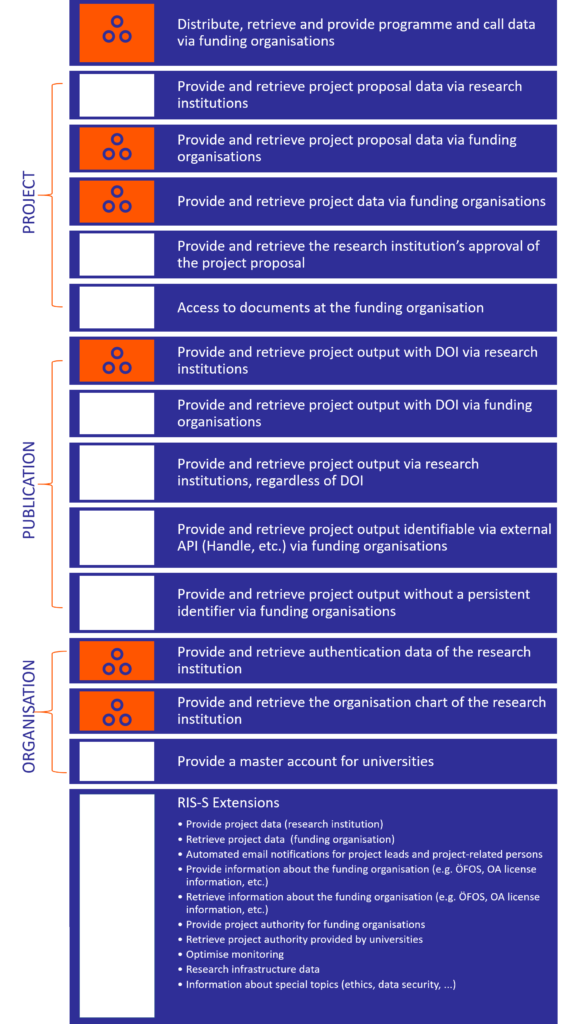- Overview
- Starting position
- Goals
- Project description
KEY DATA
Project lead: Dipl.-Ing. Sabine Neff, MSc; Forschungsinformationssysteme, TU Wien
Duration: March 2020 – December 2024
RIS Synergy provides relief and increases visibility for science by standardising and digitising services, along with building expert networks.
The project develops open access and exchange opportunities for the systems of funding organisations, research institutions and the public administration, thus building a sustainable foundation for digitising the research landscape in Austria. The standardised exchange of metadata relieves the administrative workload of researchers, enhances the efficiency and quality of research support, and improves the data quality of research output. Connecting research information, initiatives, projects and services enables RIS Synergy to give a substantiated and diverse depiction of Austrian centres of research.
RIS Synergy also carries out a concept study for a national research portal. A national research portal would render the research achievements in our country visible to everyone. It could help identify new research priorities at an early stage and offer innovative networking opportunities for research, politics, business, and the interested public.
STARTING POSITION
With the “Digital Austria” initiative and the eGovernment Act coming into effect in 2020, the Austrian administration set a clear focus on digital transformation.
Such a focus presents various opportunities for the research landscape: Digital processes facilitate communication between funding organisations, research institutions, researchers and ministries. They also provide qualitative, transparent and secure information. They have the potential to reallocate science and research resources and to support innovative cooperation platforms and synergies to strengthen Austria as a research location.
A key goal of digital transformation is to make available structured and electronically stored data that only needs to be collected once. This once-only principle is a fundamental principle of the EU eGovernment Action Plan 2016–2020 and a central focus in Austria.
Currently, however, data entry in research information systems is completely decoupled: For one, researchers have to fill in the CRIS databases of their research institutions to meet internal governance requirements as well as reporting requirements internally and to the ministries. For another, researchers have to enter the same data into the systems of funding organisations for application management. There are also similar activities in project approval and reporting processes in both systems.
Using standardised interfaces would minimise additional efforts and error rates when making duplicate entries and would facilitate implementing security and quality requirements.
GOALS
- Digitisation and increasing the effectiveness of administrative support for research projects in the spirit of “debureaucratisation in the higher education sector”
- Saving resources and increasing the competitiveness of researchers through qualitative support
- Increase in data quality and transparency for research institutions, funding organisations and public bodies (national and international)
- Standardised, open interfaces
- Implementing the once-only principle
- Sustainable handling of data in accordance with the GDPR
- Representation of input and output of the research landscape according to international standards (CERIF)
- Development of a common position regarding a national research portal
PROJECT DESCRIPTION
The project consists of two parts:
- Interfaces
- Concept Study for a Research Portal
Interfaces
The analysis phase of “Interfaces” is complete. We described user stories and developed use cases in seven working groups: call information, project master data, research output, financial data, organisational structure and account management, standards, and data management plans. We systematically described use cases, grouped and analysed them for technical feasibility, and then prioritised them, since not all use cases can be implemented during the project.
The following use cases will be realised within RIS Synergy:

- Distribute, retrieve and provide programme and call data via funding organisations
- Provide and retrieve project proposal data via funding organisations
- Provide and retrieve project data via funding organisations
- Provide and retrieve project output with DOI via research institutions
- Provide and retrieve authentication data of the research institution
- Provide and retrieve the organisation chart of the research institution
These use cases are currently in implementation. Depending on resources, it is possible that further use cases might be prioritised and realised within the project.
In the implementation phase, pilot partners (universities and funding organisations) develop and realise interfaces. In the following pilot phase, precise documentation will be carried out, which will enable all Austrian research institutions to connect to the interfaces and use them.
Concept Study for a Research Portal:
Taking into account the interfaces developed as part of the project, the concept study establishes the framework for an Austrian national research portal.
It includes the following work packages:
- Analysis
- Thematic definition
- Variants
The analysis phase saw the formation of three working groups:
- Target group analysis
- Inter-country comparisons
- Lessons Learned
The results of the analysis phase define the topics to be further examined. On this basis, variants for a potential Austrian research portal will be developed.

